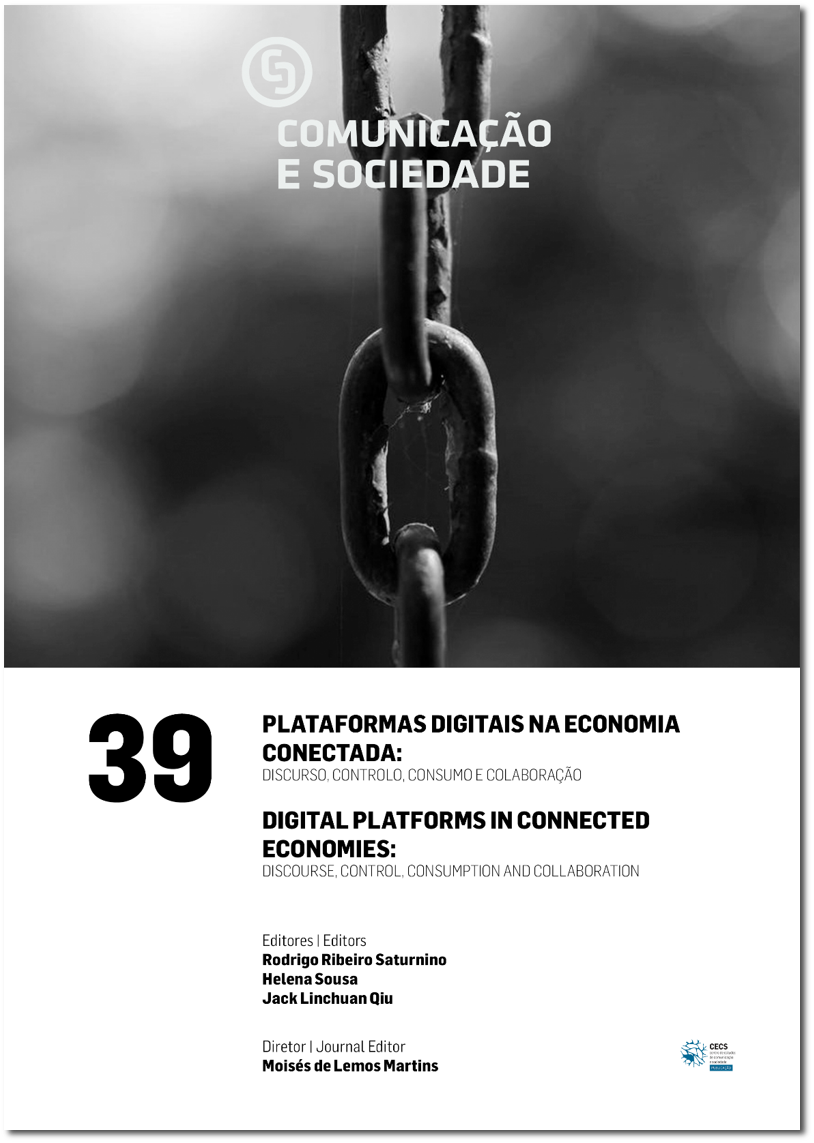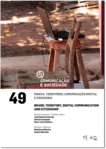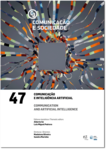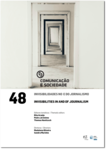Construindo Confiança em Plataformas Digitais Para Partilhar Estilos de Vida Colaborativos em Contextos Sustentáveis
DOI:
https://doi.org/10.17231/comsoc.39(2021).2789Palavras-chave:
plataformas digitais, partilha, estilos de vida colaborativos, confiança, sustentávelResumo
A designação de “economia de partilha” pretende identificar um conjunto de relações sociais, digitalmente mediadas, baseadas nos princípios da reciprocidade e confiança. Todavia, tais princípios devem resultar dos requisitos tecnológicos e de design das plataformas utilizadas onde os utilizadores depositam os seus dados pessoais, inserem informações sobre interesses e práticas quotidianas, comunicam com desconhecidos e, desta forma, criam vínculos pessoais. Este estudo tem como objetivo identificar um conjunto de diretrizes para a construção da confiança na partilha de estilos de vida colaborativos mediada digitalmente por plataformas que promovem partilha de experiências em contextos sustentáveis. Neste estudo, a partilha de estilos de vida colaborativos é compreendida como uma troca social não monetária de conhecimentos, habilidades, acomodação e alimentação. As plataformas analisadas, Volunteers Base, The Poosh e WWOOF Portugal, são organizações não comerciais que promovem experiências em projetos de educação em ecovilas, de construção natural em zonas rurais, de permacultura em quintas, entre outros. Realizou-se, portanto, um estudo multicasos e documental dos termos e políticas divulgados por estas plataformas digitais. Estes documentos reguladores foram submetidos a uma análise de conteúdo com auxílio dos softwares Iramuteq e MAXQDA. Desta análise emergiram 20 diretrizes, em três categorias: “práticas e condutas”; “condições”; e “segurança e privacidade”, que podem orientar os utilizadores e as plataformas na intenção de construir relações de partilha mediadas digitalmente de forma transparente e confiável.
Downloads
Referências
Adali, S., Escriva, R., Goldberg, M. K., Hayvanovych, M., Magdon-Ismail, M., Szymanski, B. K., Wallace, W. A., & Williams, G. (2010). Measuring behavioral trust in social networks. In 2010 IEEE International Conference on Intelligence and Security Informatics (pp. 150–152). IEEE. https://doi.org/10.1109/ISI.2010.5484757
Bardin, L. (2011). Análise de conteúdo (L. A. Reta & A. Pinheiro, Trad.). Edições 70. (Trabalho original publicado em 1977)
Bauman, Z. (2004). Amor líquido: Sobre a fragilidade dos laços humanos (C. A. Medeiros, Trad.). Zahar. (Trabalho original publicado em 2003)
Botsman, R., & Rogers, R. (2011). O que é meu é seu: Como o consumo colaborativo vai mudar o nosso mundo (1.ª ed.; R. Sardenberg, Trad.). Bookman. (Trabalho original publicado em 2010)
Chan, J. K. H., & Zhang, Y. (2018). Sharing space: Urban sharing, sharing a living space, and shared social spaces. Space and Culture, 24(1), 157–169. https://doi.org/10.1177/1206331218806160
Chen, X., Proulx, B., Gong, X., & Zhang, J. (2013). Social trust and social reciprocity based cooperative D2D communications. In Proceedings of the fourteenth ACM international symposium on mobile ad hoc networking and computing (pp. 187–196). Association for Computing Machinery. https://doi.org/10.1145/2491288.2491302
Cheshire, C. (2011). Online trust, trustworthiness, or assurance? Daedalus, 140(4), 49–58. https://doi.org/10.1162/DAED_a_00114
Chuang, L., He, J., & Chiu, S. (2018). Understanding user participantion in sharing economy services. In 2018 IEEE International Conference on Consumer Electronics-Taiwan (ICCE-TW) (pp. 1–2). IEEE. https://doi.org/10.1109/ICCE-China.2018.8448712
European Union. (2018). Rural areas and the primary sector in the EU. https://ec.europa.eu/info/sites/info/files/food-farming-fisheries/farming/documents/eu-rural-areas-primary-sector_en.pdf
Floridi, L. (Ed.). (2015). The onlife manifesto: Being human in a hyperconnected era. Springer Nature. https://doi.org/10.1007/978-3-319-04093-6
Fogg, B. J. (2003). Persuasive technology: Using computers to change what we think and do. Elsevier.
Gray, D. E. (2014). Doing research in the real world (1ª ed.). Sage.
Hang, C.-W., Wang, Y., & Singh, M. P. (2009). Operators for propagating trust and their evaluation in social networks. In AAMAS ‘09: Proceedings of The 8th International Conference on Autonomous Agents and Multiagent Systems - Volume 2 (pp. 1025–1032). International Foundation for Autonomous Agents and Multiagent Systems. https://doi/10.5555/1558109.1558155
Igarashi, T., Kashima, Y., Kashima, E. S., Farsides, T., Kim, U., Strack, F., Werth, L., & Yuki, M. (2008). Culture, trust, and social networks. Asian Journal of Social Psychology, 11(1), 88–101. https://doi.org/10.1111/j.1467-839X.2007.00246.x
Jiang, W., Wang, G., & Wu, J. (2014). Generating trusted graphs for trust evaluation in online social networks. Future Generation Computer Systems, 31(1), 48–58. https://doi.org/10.1016/j.future.2012.06.010
Kamal, P., & Chen, J. Q. (2016). Trust in sharing economy. In Proceeding of the 20th Pacific Asia Conference on Information Systems (PACIS 2016) (pp. 1–13). Association for Information Systems AIS Electronic Library (AISeL). https://aisel.aisnet.org/pacis2016/109
Lee, Z. W. Y., Chan, T. K. H., Balaji, M. S., & Chong, A. Y. (2018). Why people participate in the sharing economy: An empirical investigation of Uber. Internet Research, 28(3), 829–850. https://doi.org/10.1108/IntR-01-2017-0037
Luhmann, N. (2005). Confianza (A. Flores, Trad.). Anthropos. (Trabalho original publicado em 1979)
Lutz, C., Hoffmann, C. P., Bucher, E., & Fieseler, C. (2018). The role of privacy concerns in the sharing economy. Information, Communication & Society, 21(10), 1472–1492. https://doi.org/10.1080/1369118X.2017.1339726
McMillan, D. W., & Chavis, D. M. (1986). Sense of community: A definition and theory. Journal of Community Psychology, 14(1), 6–23. https://doi.org/10.1002/1520-6629(198601)14:1<6::AID-JCOP2290140103>3.0.CO;2-I
Sales, R. K. L., Baldi, V., & Amaro, A. C. (2020). Idealização de um modelo para compreensão da construção da confiança nas plataformas da economia de partilha. In J. C. F. Benítez (Ed.), Estudios multidisciplinarios en comunicación audiovisual, interactividad y marca en la red (pp. 178–196). Egregius.
Santos, G. E., & Prates, R. O. (2018). Evaluating the PROMISE framework for trust in sharing economy system. In IHC 2018: Proceedings of the 17th brazilian symposium on human factors in computing systems (pp. 1–11). Association for Computing Machinery.
Shirky, C. (2011). A cultura da participação: Criatividade e generosidade no mundo conectado (C Portocarrero, Trad.). Zahar. (Trabalho original publicado em 2010)
Stake, R. E. (2006). Multiple case study analysis. Guilford press.
Stern Strategy Group. (2015, 18 de setembro). Rachel Botsman: Transformation in how we think about trust [Vídeo]. YouTube. https://www.youtube.com/watch?v=ced159PQu4I
TED. (2016, 7 de novembro). We’ve stopped trusting institutions and started trusting strangers | Rachel Botsman [Vídeo]. YouTube. https://www.youtube.com/watch?v=GqGksNRYu8s
Tian, X.-F., Wu, R.-Z., & Lee, J.-H. (2017). Use intention of chauffeured car services by O2O and sharing economy. Journal of Distribution Science, 15(12), 73–84. http://doi.org/10.15722/jds.15.12.201712.73
Wang, W., Qiu, L., Kim, D., & Benbasat, I. (2016). Effects of rational and social appeals of online recommendation agents on cognition- and affect-based trust. Decision Support Systems, 86(1), 48–60. https://doi.org/10.1016/j.dss.2016.03.007
Wu, J., Ma, P., & Xie, K. L. (2017). In sharing economy we trust: The effects of host attributes on short-term rental purchases. International Journal of Contemporary Hospitality Management, 29(11), 2962-2976. https://doi.org/10.1108/IJCHM-08-2016-0480
Yang, S.-B., Lee, K., Lee, H., Chung, N., & Koo, C. (2016). Trust breakthrough in the sharing economy: An empirical study of Airbnb. In Proceeding of the 20th Pacific Asia Conference on Information Systems (PACIS 2016) (pp. 1–8). Association for Information Systems AIS Electronic Library (AISeL). https://aisel.aisnet.org/pacis2016/131/
Ye, T., Alahmad, R., Pierce, C., & Robert, L. P., Jr. (2017). Race and rating on sharing economy platforms: The effect of race similarity and reputation on trust and booking intention in Airbnb. In ICIS 2017 Proceedings (pp. 1–11). AIS. https://aisel.aisnet.org/icis2017/Peer-to-Peer/Presentations/4/
Yoon, Y. S., & Lee, H.-W. (2017). Perceived risks, role, and objectified trustworthiness information in the sharing economy. In 2017 Ninth International Conference on Ubiquitous and Future Networks (ICUFN) (pp. 326-331). IEEE. https://doi.org/10.1109/ICUFN.2017.7993803
Zhang, Z. & Wang, K. (2013). A trust model for multimedia social networks. Social Network Analysis and Mining, 3(4), 969–979. https://doi.org/10.1007/s13278-012-0078-4
Downloads
Publicado
Como Citar
Edição
Secção
Licença
Direitos de Autor (c) 2021 Comunicação e Sociedade

Este trabalho encontra-se publicado com a Creative Commons Atribuição-NãoComercial 4.0.
Os autores são titulares dos direitos de autor, concedendo à revista o direito de primeira publicação. O trabalho é licenciado com uma Licença Creative Commons - Atribuição 4.0 Internacional.











